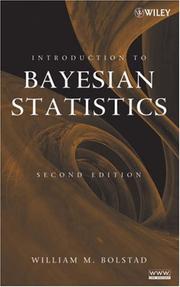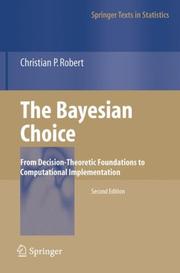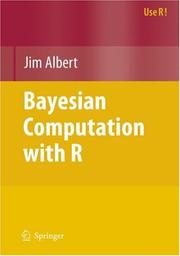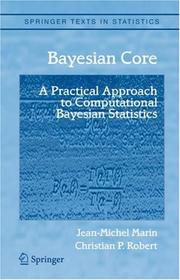| Listing 1 - 6 of 6 |
Sort by
|
Book
Year: 2007 Publisher: Liège : Université de Liège, Institut de mathématique (ULg),
Abstract | Keywords | Export | Availability | Bookmark
 Loading...
Loading...Choose an application
- Reference Manager
- EndNote
- RefWorks (Direct export to RefWorks)
Statistique bayésienne --- Statistique mathematique --- Estimateurs --- Statistique mathématique

ISBN: 9780470141151 0470141158 Year: 2007 Publisher: Hoboken, N.J. Wiley
Abstract | Keywords | Export | Availability | Bookmark
 Loading...
Loading...Choose an application
- Reference Manager
- EndNote
- RefWorks (Direct export to RefWorks)

ISBN: 9782287339066 228733906X Year: 2007 Publisher: Paris : Springer-Verlag France,
Abstract | Keywords | Export | Availability | Bookmark
 Loading...
Loading...Choose an application
- Reference Manager
- EndNote
- RefWorks (Direct export to RefWorks)
Bayesian statistical decision theory --- Statistique bayésienne --- Economics --- Mathematical statistics --- Statistics --- Statistique bayésienne --- EPUB-LIV-FT LIVSTATI SPRINGER-B --- Economics - Statistics --- Statistique

ISBN: 9780387715988 0387715991 0387715983 Year: 2007 Publisher: New York : Springer,
Abstract | Keywords | Export | Availability | Bookmark
 Loading...
Loading...Choose an application
- Reference Manager
- EndNote
- RefWorks (Direct export to RefWorks)
Winner of the 2004 DeGroot Prize This paperback edition, a reprint of the 2001 edition, is a graduate-level textbook that introduces Bayesian statistics and decision theory. It covers both the basic ideas of statistical theory, and also some of the more modern and advanced topics of Bayesian statistics such as complete class theorems, the Stein effect, Bayesian model choice, hierarchical and empirical Bayes modeling, Monte Carlo integration including Gibbs sampling, and other MCMC techniques. It was awarded the 2004 DeGroot Prize by the International Society for Bayesian Analysis (ISBA) for setting "a new standard for modern textbooks dealing with Bayesian methods, especially those using MCMC techniques, and that it is a worthy successor to DeGroot's and Berger's earlier texts". Christian P. Robert is Professor of Statistics in the Applied Mathematics Department at the Université Paris Dauphine, and Head of the Statistics Laboratory at the Center for Research in Economics and Statistics (CREST) of the National Institute for Statistics and Economic Studies (INSEE) in Paris. In addition to many papers on Bayesian statistics, simulation methods, and decision theory, he has written four other books, including Monte Carlo Statistical Method (Springer 2004) with George Casella and Bayesian Core (Springer 2007) with Jean-Michel Marin. He has served or is serving as associate editor for the Annals of Statistics, Bayesian Analysis, the Journal of the American Statistical Association, Statistical Science, and Sankhya. and is editor of the Journal of the Royal Statistical Society (Series B) from 2006–2009. He is a fellow of the Institute of Mathematical Statistics, and received the 1995 Young Statistician Award of the Société de Statistique de Paris. Review of the second edition: "The text reads fluently and beautifully throughout, with light, good-humoured touches that warm the reader without being intrusive. There are many examples and exercises, some of which draw out the essence of work of other authors. Only a few displays and equations have numbers attached. This is an extremely fine, exceptional text of the highest quality." (ISI Short Book Reviews).
Bayesian statistical decision theory. --- Statistique bayésienne --- Bayesian statistical decision theory --- Méthode statistique --- Statistical methods --- Aide à la décision --- decision support --- Statistics --- Statistique bayésienne --- EPUB-LIV-FT LIVSTATI SPRINGER-B --- Statistics. --- Statistical decision. --- Probabilities. --- Statistics . --- Probability Theory and Stochastic Processes. --- Statistical Theory and Methods. --- Statistical analysis --- Statistical data --- Statistical science --- Mathematics --- Econometrics --- Probability --- Statistical inference --- Combinations --- Chance --- Least squares --- Mathematical statistics --- Risk --- Statistique mathematique --- Methodes numeriques

ISBN: 0387713859 0387713840 9780387713847 9780387713854 Year: 2007 Publisher: New York, N.Y. Springer
Abstract | Keywords | Export | Availability | Bookmark
 Loading...
Loading...Choose an application
- Reference Manager
- EndNote
- RefWorks (Direct export to RefWorks)
There has been a dramatic growth in the development and application of Bayesian inferential methods. Some of this growth is due to the availability of powerful simulation-based algorithms to summarize posterior distributions. There has been also a growing interest in the use of the system R for statistical analyses. R's open source nature, free availability, and large number of contributor packages have made R the software of choice for many statisticians in education and industry. Bayesian Computation with R introduces Bayesian modeling by the use of computation using the R language. The early chapters present the basic tenets of Bayesian thinking by use of familiar one and two-parameter inferential problems. Bayesian computational methods such as Laplace's method, rejection sampling, and the SIR algorithm are illustrated in the context of a random effects model. The construction and implementation of Markov Chain Monte Carlo (MCMC) methods is introduced. These simulation-based algorithms are implemented for a variety of Bayesian applications such as normal and binary response regression, hierarchical modeling, order-restricted inference, and robust modeling. Algorithms written in R are used to develop Bayesian tests and assess Bayesian models by use of the posterior predictive distribution. The use of R to interface with WinBUGS, a popular MCMC computing language, is described with several illustrative examples. This book is a suitable companion book for an introductory course on Bayesian methods and is valuable to the statistical practitioner who wishes to learn more about the R language and Bayesian methodology. The LearnBayes package, written by the author and available from the CRAN website, contains all of the R functions described in the book. Jim Albert is Professor of Statistics at Bowling Green State University. He is Fellow of the American Statistical Association and is past editor of The American Statistician. His books include Ordinal Data Modeling (with Val Johnson), Workshop Statistics: Discovery with Data, A Bayesian Approach (with Allan Rossman), and Bayesian Computation using Minitab.
Bayesian statistical decision theory --- R (Computer program language) --- Data processing. --- GNU-S (Computer program language) --- Domain-specific programming languages --- Bayes' solution --- Bayesian analysis --- Statistical decision --- Mathematical statistics. --- Computer simulation. --- Computer science --- Visualization. --- Mathematical optimization. --- Statistics and Computing/Statistics Programs. --- Simulation and Modeling. --- Computational Mathematics and Numerical Analysis. --- Optimization. --- Mathematics. --- Optimization (Mathematics) --- Optimization techniques --- Optimization theory --- Systems optimization --- Mathematical analysis --- Maxima and minima --- Operations research --- Simulation methods --- System analysis --- Visualisation --- Imagination --- Visual perception --- Imagery (Psychology) --- Computer mathematics --- Discrete mathematics --- Electronic data processing --- Computer modeling --- Computer models --- Modeling, Computer --- Models, Computer --- Simulation, Computer --- Electromechanical analogies --- Mathematical models --- Model-integrated computing --- Mathematics --- Statistical inference --- Statistics, Mathematical --- Statistics --- Probabilities --- Sampling (Statistics) --- Statistical methods --- Statistique bayésienne --- Statistique mathematique --- Methodes numeriques --- Programmes informatiques --- Mathematical statistics --- Programming --- Data processing

ISBN: 0387389830 0387389792 1441922865 9780387389790 9780387389837 Year: 2007 Publisher: New York, N.Y. Springer
Abstract | Keywords | Export | Availability | Bookmark
 Loading...
Loading...Choose an application
- Reference Manager
- EndNote
- RefWorks (Direct export to RefWorks)
This Bayesian modeling book is intended for practitioners and applied statisticians looking for a self-contained entry to computational Bayesian statistics. Focusing on standard statistical models and backed up by discussed real datasets available from the book website, it provides an operational methodology for conducting Bayesian inference, rather than focusing on its theoretical justifications. Special attention is paid to the derivation of prior distributions in each case and specific reference solutions are given for each of the models. Similarly, computational details are worked out to lead the reader towards an effective programming of the methods given in the book. While R programs are provided on the book website and R hints are given in the computational sections of the book, The Bayesian Core requires no knowledge of the R language and it can be read and used with any other programming language. The Bayesian Core can be used as a textbook at both undergraduate and graduate levels, as exemplified by courses given at Université Paris Dauphine (France), University of Canterbury (New Zealand), and University of British Columbia (Canada). It serves as a unique textbook for a service course for scientists aiming at analyzing data the Bayesian way as well as an introductory course on Bayesian statistics. The prerequisites for the book are a basic knowledge of probability theory and of statistics. Methodological and data-based exercises are included within the main text and students are expected to solve them as they read the book. Those exercises can obviously serve as assignments, as was done in the above courses. Datasets, R codes and course slides all are available on the book website. Jean-Michel Marin is currently senior researcher at INRIA, the French Computer Science research institute, and located at Université Paris-Sud, Orsay. He has previously been Assistant Professor at Université Paris Dauphine for four years. He has written numerous papers on Bayesian methodology and computing, and is currently a member of the council of the French Statistical Society. Christian Robert is Professor of Statistics at Université Paris Dauphine and Head of the Statistics Research Laboratory at CREST-INSEE, Paris. He has written over a hundred papers on Bayesian Statistics and computational methods and is the author or co-author of seven books on those topics, including The Bayesian Choice (Springer, 2001), winner of the ISBA DeGroot Prize in 2004. He is a Fellow and member of the council of the Institute of Mathematical Statistics, and a Fellow and member of the research committee of the Royal Statistical Society. He is currently co-editor of the Journal of the Royal Statistical Society, Series B, after taking part in the editorial boards of the Journal of the American Statistical Society, the Annals of Statistics, Statistical Science, and Bayesian Analysis. He is also the winner of the Young Statistician prize of the Paris Statistical Society in 1996 and a recipient of an Erskine Fellowship from the University of Canterbury (NZ) in 2006.
Mathematics. --- Mathematical statistics. --- Computer simulation. --- Computer mathematics. --- Probabilities. --- Statistics. --- Computational intelligence. --- Probability Theory and Stochastic Processes. --- Statistical Theory and Methods. --- Probability and Statistics in Computer Science. --- Simulation and Modeling. --- Computational Intelligence. --- Computational Mathematics and Numerical Analysis. --- Intelligence, Computational --- Artificial intelligence --- Soft computing --- Statistical analysis --- Statistical data --- Statistical methods --- Statistical science --- Mathematics --- Econometrics --- Probability --- Statistical inference --- Combinations --- Chance --- Least squares --- Mathematical statistics --- Risk --- Computer mathematics --- Discrete mathematics --- Electronic data processing --- Computer modeling --- Computer models --- Modeling, Computer --- Models, Computer --- Simulation, Computer --- Electromechanical analogies --- Mathematical models --- Simulation methods --- Model-integrated computing --- Statistics, Mathematical --- Statistics --- Probabilities --- Sampling (Statistics) --- Math --- Science --- Bayesian statistical decision theory --- Bayes' solution --- Bayesian analysis --- Statistical decision --- Distribution (Probability theory. --- Computer science. --- Engineering. --- Computer science --- Distribution functions --- Frequency distribution --- Characteristic functions --- Construction --- Industrial arts --- Technology --- Informatics --- Statistics . --- regressie-analyse --- wiskundige statistiek --- R (Computer program language). --- Statistique bayésienne --- GNU-S (Computer program language) --- Domain-specific programming languages --- Bayesian statistical decision theory - Textbooks --- Statistique mathematique --- Methodes numeriques --- Programmes informatiques --- R (Computer program language)
| Listing 1 - 6 of 6 |
Sort by
|

 Search
Search Feedback
Feedback About UniCat
About UniCat  Help
Help News
News